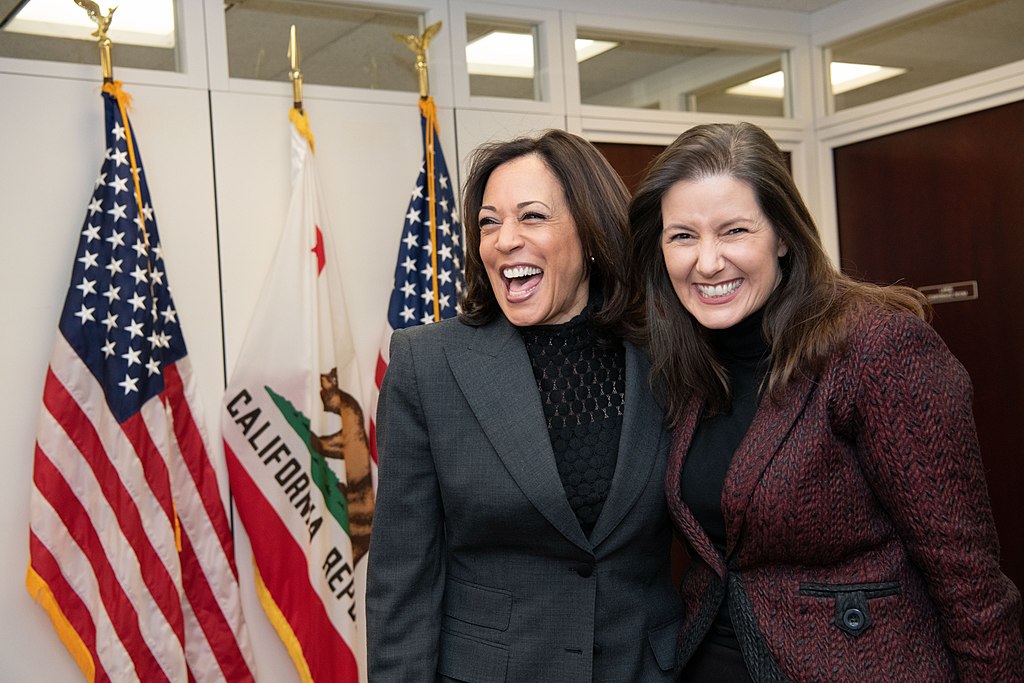Vice President Kamala Harris faced scrutiny over her approach to rising grocery prices during a recent appearance, where critics noted she appeared to rely heavily on pre-written scripts and guidance from her handlers. As Harris attempted to explain how her administration plans to combat inflationary pressures affecting food prices—a concern that has become a significant issue for American families—she appeared to struggle to deliver a clear solution, focusing primarily on the administration’s approach to handling price spikes during hurricanes rather than providing a broader strategy.
Grocery prices have surged more than 25% since Harris and President Joe Biden took office, a point her critics have repeatedly highlighted. During her remarks, Harris referenced steps the administration takes to address shortages and price increases following natural disasters like hurricanes. However, her comments did not address what many see as the underlying causes of inflation, leaving some observers questioning whether the administration has a concrete plan to manage long-term price stability.
Harris’s reliance on prepared notes drew criticism from those who argue that such dependency undermines her public messaging on pressing economic issues. “When people are paying more at the grocery store every week, they want real solutions, not talking points,” said Rebecca Stone, a political analyst. “Addressing disaster responses is important, but it doesn’t provide answers to families who are feeling the impact of inflation on a daily basis.”
The cost of groceries has risen steadily, impacting essential items like meat, dairy, and produce. Many Americans are feeling the strain, with some families struggling to afford basic staples amid high inflation. Despite these concerns, Harris’s response focused more on emergency responses to natural disasters rather than addressing the structural issues behind everyday price increases.
The moment has fueled criticism from conservative commentators and political opponents, who argue that Harris’s approach reflects a disconnect between the administration and the average consumer’s struggles. Critics contend that while emergency responses are necessary, the administration has yet to lay out a coherent plan for curbing inflation at the grocery store. “Hurricanes are not responsible for rising food costs over the past two years,” remarked Sen. Tom Barrett (R-MI). “People need solutions that address the realities of inflation, not short-term fixes aimed at temporary price spikes.”
Supporters of Harris, however, argue that focusing on supply chain issues exacerbated by climate events is a necessary part of addressing inflation. They maintain that price stabilization requires a multi-faceted approach, one that includes managing supply and demand during crises as well as addressing systemic factors over time.
As inflation continues to impact household budgets, the effectiveness of Harris’s communication on economic issues remains under scrutiny. For many families, the question of how to afford basic groceries is immediate and pressing. With Election Day approaching, the administration’s handling of inflation is likely to play a critical role in shaping public perception, making Harris’s responses all the more significant.



 U.S. to Begin Paying UN Dues as Financial Crisis Spurs Push for Reforms
U.S. to Begin Paying UN Dues as Financial Crisis Spurs Push for Reforms  TrumpRx.gov Highlights GLP-1 Drug Discounts but Offers Limited Savings for Most Americans
TrumpRx.gov Highlights GLP-1 Drug Discounts but Offers Limited Savings for Most Americans  Japan Election 2026: Sanae Takaichi Poised for Landslide Win Despite Record Snowfall
Japan Election 2026: Sanae Takaichi Poised for Landslide Win Despite Record Snowfall  China Warns US Arms Sales to Taiwan Could Disrupt Trump’s Planned Visit
China Warns US Arms Sales to Taiwan Could Disrupt Trump’s Planned Visit  Trump Lifts 25% Tariff on Indian Goods in Strategic U.S.–India Trade and Energy Deal
Trump Lifts 25% Tariff on Indian Goods in Strategic U.S.–India Trade and Energy Deal  Netanyahu to Meet Trump in Washington as Iran Nuclear Talks Intensify
Netanyahu to Meet Trump in Washington as Iran Nuclear Talks Intensify  Nighttime Shelling Causes Serious Damage in Russia’s Belgorod Region Near Ukraine Border
Nighttime Shelling Causes Serious Damage in Russia’s Belgorod Region Near Ukraine Border  Trump’s Inflation Claims Clash With Voters’ Cost-of-Living Reality
Trump’s Inflation Claims Clash With Voters’ Cost-of-Living Reality  Trump Allegedly Sought Airport, Penn Station Renaming in Exchange for Hudson River Tunnel Funding
Trump Allegedly Sought Airport, Penn Station Renaming in Exchange for Hudson River Tunnel Funding  Iran–U.S. Nuclear Talks in Oman Face Major Hurdles Amid Rising Regional Tensions
Iran–U.S. Nuclear Talks in Oman Face Major Hurdles Amid Rising Regional Tensions  Missouri Judge Dismisses Lawsuit Challenging Starbucks’ Diversity and Inclusion Policies
Missouri Judge Dismisses Lawsuit Challenging Starbucks’ Diversity and Inclusion Policies  Trump Endorses Japan’s Sanae Takaichi Ahead of Crucial Election Amid Market and China Tensions
Trump Endorses Japan’s Sanae Takaichi Ahead of Crucial Election Amid Market and China Tensions  Trump Backs Nexstar–Tegna Merger Amid Shifting U.S. Media Landscape
Trump Backs Nexstar–Tegna Merger Amid Shifting U.S. Media Landscape  Trump Signs Executive Order Threatening 25% Tariffs on Countries Trading With Iran
Trump Signs Executive Order Threatening 25% Tariffs on Countries Trading With Iran  Pentagon Ends Military Education Programs With Harvard University
Pentagon Ends Military Education Programs With Harvard University  Ohio Man Indicted for Alleged Threat Against Vice President JD Vance, Faces Additional Federal Charges
Ohio Man Indicted for Alleged Threat Against Vice President JD Vance, Faces Additional Federal Charges  U.S.-India Trade Framework Signals Major Shift in Tariffs, Energy, and Supply Chains
U.S.-India Trade Framework Signals Major Shift in Tariffs, Energy, and Supply Chains 































